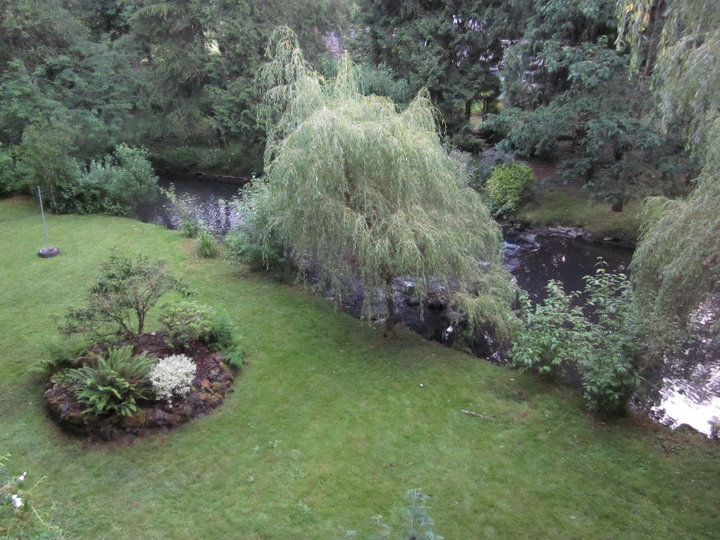A New Look at the Benefits of Interacting with Nature
By Dr. Robert Biswas-Diener

We can do better than recommending that people "get out in nature"
Introduction
I’ll be honest, I’ve always been slightly skeptical of “the general advice to “go outside” as a means of increasing one’s wellbeing. To be clear, my hesitancy is not because I am anti-nature in any way. I live in the Pacific Northwest, widely regarded as one of the USA’s most beautiful regions. I am a hiker, and climber, and have been a runner and a skier. I love being outside. My skepticism is rooted in the one-size-fits-all idea that “nature bathing” is an inherent psychological good for all people. Here, I will cover some of the basic research on the topic while attempting to provide a little nuance in my discussion of nature and wellbeing.
The Benefits of Nature

In 1984, biologist Edward O. Wilson published Biophilia. In this book, he championed the idea that people have an inborn affinity for natural environments. He argued that urbanization is a relatively recent phenomenon and that people gravitate toward natural environments. Even those of us who live in cities (more than half the world’s population now and 70% by 2050) have a tendency to keep pets, have houseplants, and include windows in our homes. According to the biophilia hypothesis, people do well when they are able to satisfy their inherent need to connect with nature.
Indeed, research offers support for this notion. Several studies have shown that people with a view of nature from work and home experience higher life satisfaction, have fewer problems with impulsivity, and generally do better on tests of memory. Larson and colleagues (2016) found that, in an analysis of 44 American cities, the percentage of land covered by city parks is positively associated with health, community, and financial wellbeing. In two eye-popping studies from the 1980s, researchers found that A) prisoners with a view of natural farmland made fewer medical visits, and B) people whose hospital rooms had a natural view recovered more quickly from surgery. Taken together, these and similar studies point to the promising benefits of interacting with and being connected to nature.
Why might nature be beneficial?

The idea that people can derive benefit from contact with nature is less interesting to me than the possible reasons why this might occur. One possibility is that when people head into nature, it often requires physical exercise. They walk, bike, ski, or backpack. Therefore, it is possible that it is a physical exercise intervention rather than a so-called “green intervention.” To test this, a group of researchers from Stanford University randomly assigned people to either an urban walk or a bucolic walk in a park with rolling grasslands. The nature-walkers experienced significantly less anxiety, rumination, and negative affect. This study suggests that physical activity might be common in natural environments but something about the landscape confers additional benefit above and beyond just physical exercise.
Fortunately, researchers have explored other processes that might spin natural straw into psychological gold. These include:
- Mental activity: One explanation for the psychological benefits of exposure to nature lies in understanding our cognitive processes. The prevailing theory here is known as “attention restoration.” Simply put, urban environments require a heavy cognitive load. Consider the act of crossing a city street. You must scan the visual and auditory environment, make decisions about the relative speed, direction, and safety of moving objects, track the presence of other people, and call forth the rules of the road. Here, attention is viewed as a voluntary, effortful resource. Over time, mental processing can be fatiguing. Kaplan argues that having limited mental resources is actually adaptive in that it forces us to use attention judiciously. If we could focus eternally on just one detail, we might miss out on the bigger picture. Mental fatigue helps us “pull back” and re-engage with the larger environment from time to time. By contrast, natural environments require far less processing. Being exposed to nature allows our minds to relax a bit. By far, my favorite term associated with this is “soft fascination.” This is the idea that natural environments capture involuntary attention but hold that attention only loosely. Just imagine: scanning leaves, looking at sand dunes, seeing wind blow the grass, watching the flow of water, looking at the rise and sweep of mountains; each of these grabs at your attention but none of them arrest it or hold it for long. As a result, you get a bit of a cognitive break and might feel restored.
- Emotional activity: Research also suggests the possibility of emotional processes being implicated in the nature-benefit relationship. Some evolutionary theorists argue that certain natural environments such as a grove of trees, a raised hill, or a rocky overhang, have served as potential refuges for people across history. According to this line of reasoning, modern people can also experience an emotional sense of safety when we see nature as a potential refuge. Studies offer some support for this. People who have been exposed to nature show benefits in their parasympathetic responses and a reduction in the stress-hormone cortisol.
Where We Go From Here

Despite the growing body of evidence, we must acknowledge that we are just beginning to scratch the surface of understanding the potential psychological benefits of being in nature. For those who already know that nature is a sure bet for their wellbeing, additional data might not be necessary. For others, however, more research is needed before we can make the best recommendations regarding how best to interact with nature. Here are just a few areas where we might focus research attention:
- What counts as nature? Some research suggests that a view of nature through a window is sufficient to provide some benefits. One study suggests that a photograph of nature was all it took to lower anxiety in dental patients. Taken together, there is reason to wonder what, exactly, constitutes being out in nature. Could you benefit from a scenic image on your computer desktop or a beautiful scene stuck to your refrigerator? What about agricultural fields and orchards? Is physical interaction with nature better than looking at a scene of nature and, if so, how much better?
- What type of nature? There is a tendency to speak of nature as if it is a monolithic concept and includes everything that is not part of the human-built environment. Common sense would tell us that nature is diverse and that various environments might lead to different psychological consequences. Are waves on the open ocean comparable to the dense foliage of the jungle? Are snowfields and rocky peaks experienced the same as are rolling sand dunes or vast prairies?
- What attitudes does a person hold regarding nature? Not too long ago, I had lunch with a doctoral student who was researching the experience of nature among black Americans. She discussed the history of lynchings and race-based violence that often occurred outside of urban environments and in natural areas. This conversation was a reminder that each person harbors their own attitudes about nature. I have gone hiking, for example, with people for whom the forest feels like a dangerous and forbidding place or with people who get cold easily or who sunburn in only minutes. It would be good to know more about the ways that attitudes and expectations play into the possible benefits of nature.
- How novel is nature? It seems odd to make a blanket recommendation to all people that they should get out into nature. First, it sounds like the assumption is that they are not already interacting with nature. It might be helpful to know how novel natural experiences are for any given person. For example, a farmer, a groundskeeper, a snowplow operator, and a utility worker might all feel that they already spend a fair amount of time outdoors. It would be interesting to know how novelty of nature might enhance or detract from the benefits it confers.

About the author
Dr. Robert Biswas-Diener
Dr. Robert Biswas-Diener is passionate about leaving the research laboratory and working in the field. His studies have taken him to such far-flung places as Greenland, India, Kenya, and Israel. He is a leading authority on strengths, culture, courage, and happiness and is known for his pioneering work in the application of positive psychology to coaching.
Robert has authored more than 75 peer-reviewed academic articles and chapters, four of which are “citation classics” (cited more than 1,000 times each). Dr. Biswas-Diener has authored nine books, including the 2007 PROSE Award winner, Happiness, the New York Times Best Seller, The Upside of Your Dark Side, the 2023 coaching book Positive Provocation, and Radical Listening, in 2025.
Thinkers50 named Robert to be among the 50 most influential executive coaches in the world.
Robert Biswas-Diener

Get updates and exclusive resources



